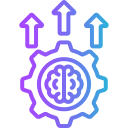Revolutionizing Patient Care with Artificial Intelligence
Artificial Intelligence is fundamentally transforming the landscape of modern healthcare, ushering in an era where patient care is smarter, faster, and more personalized than ever before. Leveraging advanced algorithms and machine learning, AI enhances every aspect of medicine, from diagnostics to treatment planning and patient monitoring. As these innovative solutions become increasingly integrated, healthcare professionals and patients alike stand to benefit from heightened efficiencies and outcomes. This evolution not only reduces clinical burdens but also opens up new frontiers in preventive care, predictive analytics, and meaningful patient-provider interactions.
Enhanced Diagnostics Through AI
AI-Powered Imaging Analysis
AI algorithms excel at processing medical images, such as X-rays, MRIs, and CT scans, with a speed and accuracy unmatched by human interpretation alone. These systems are trained on massive datasets, allowing them to recognize patterns and anomalies that might be overlooked in a traditional review. As a result, radiologists and other specialists are able to identify conditions like cancer, fractures, or vascular diseases earlier in their progression. Not only does this enhance clinical decision-making, but it also streamlines workflows, allowing healthcare teams to focus on delivering targeted care with greater confidence and efficiency.
Predictive Pathology and Disease Detection
In pathology, AI enables the microscopic evaluation of tissue samples to be both quantitative and highly sensitive. Machine learning models can be trained to recognize early markers of disease—such as cellular changes or biochemical signatures—that might not be apparent even to experienced practitioners. By providing real-time feedback on disease presence and progression, AI enhances the accuracy of biopsies and drives early interventions. This advancement means patients receive timely diagnoses, reducing the anxiety of waiting for results and increasing the window for effective treatment.
Real-Time Clinical Decision Support
Integrating AI into clinical decision support systems equips healthcare professionals with real-time data analytics and evidence-based recommendations during patient evaluations. These intelligent platforms can synthesize patient history, genetic information, and even environmental factors to suggest personalized diagnostic pathways or flag potential issues. The result is an increased capacity for clinicians to make informed decisions quickly, which minimizes diagnostic errors, reduces unnecessary testing, and supports better patient care. As technology advances, this intelligent guidance continues to push healthcare toward higher standards of safety and reliability.
AI facilitates the analysis of complex genetic data, making it possible to match patients with treatments that address the underlying causes of their conditions rather than merely alleviating symptoms. Through predictive modeling and bioinformatics tools, AI uncovers the relationships between genetic variants and drug responses, leading to highly effective, personalized therapy options. This approach has revolutionized areas like oncology and rare diseases, empowering clinicians to prescribe medications or interventions that offer the highest likelihood of success while minimizing the potential for harmful side effects.
Personalized Treatment Plans
Intelligent Scheduling and Resource Allocation
AI-powered scheduling platforms analyze historical data, patient flow, and predicted demand to efficiently allocate resources such as operating rooms, medical equipment, and staff shifts. These systems can anticipate peak periods and suggest adjustments in real time, helping clinics and hospitals run at optimal capacity. By minimizing scheduling conflicts and reducing idle time, healthcare providers can see more patients and better utilize valuable resources. The result is not only improved operational efficiency but also increased access to timely care for patients.
Automating Routine Documentation
AI solutions are increasingly used to manage the extensive documentation required in healthcare. Voice recognition and natural language processing algorithms can transcribe and categorize clinical notes, lab reports, and patient correspondence instantly and accurately. This automation significantly reduces the time clinicians spend on paperwork, freeing them to devote more attention to direct patient interactions. Enhanced data integrity and accessibility also promote continuity of care, as information flows seamlessly among all members of the healthcare team.
Improved Billing and Claims Processing
Medical billing and insurance claim processes are often complex and prone to errors, but AI is changing that by rapidly reviewing claims, detecting discrepancies, and ensuring compliance with regulatory requirements. Intelligent bots can identify patterns of fraud or overbilling, reconcile coding inconsistencies, and expedite reimbursement cycles. As a result, healthcare organizations experience increased financial efficiency, reduced administrative overhead, and improved transparency for patients in terms of billing practices and costs.
